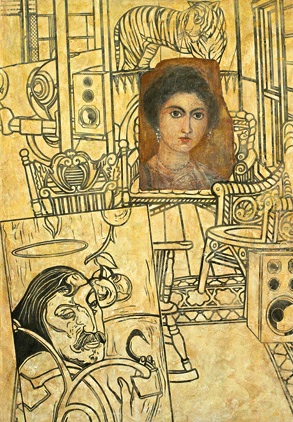 Elena Sarni, “Portrait of Gauguin” (2012)
Elena Sarni, “Portrait of Gauguin” (2012)
This essay introduces the Russian portfolio in the October issue of The American Reader (on newsstands now).
The present moment is a fine one for American readers to turn their attention back to Russia—the artistic, rather than the political Russia. In talking about why this should be so, I will avoid mentioning names (other than those chosen for print here). The purpose is not to identify zeniths and nadirs, or to pause at each landmark. Instead, it is to gain a bird’s-eye view of the topography of Russian literature in this nascent millennium, and also to examine the tectonic shift that resculpted that topography in the middle of this period. Still, readers more familiar with the material will easily guess the names behind the exemplary figures in our tale.
The generation that came to the forefront of Russian letters by the 2000s, the first genuinely post-Soviet literary elite, inherits the legacy of the last Soviet elite—the so-called Conceptualists—and with it a gnawing suspicion that form was drifting away from content, a sense of invasive irony (this will be all too familiar to the Western reader who may not, however, expect to find it in Russia), and an experimentalism flaunted for the sake, so it often seemed, of simplistic shock value. At its best, of course, Conceptualism was none of these things, but there is undeniably a reason for this growing unease.
The first and perhaps key act of resistance was an attempt to restore the power and authority that had long been attached to literature in the Russian tradition, to re-establish reverence for the Writer as Sage, the Writer as Teacher and for literature as access to Truth. Literature’s authority reached into social and political spheres, but this was never enough in Russia—social authority ascends to its rightful place in the Russian context only where it is felt to derive from moral and, especially, spiritual authority.
To an extent, this goal was achieved. It was undertaken, however, at a time when the outside world was exerting an unusual influence upon Russian culture, when the environment in which culture subsisted was changing radically. Suddenly Russian writers were faced with the notion that literature had to deliver depth while being “entertaining” in a sense Tolstoy or Turgenev surely never bothered to contemplate. The influence of a changing society, sudden consumerism and office drama, attention deficit, and a supersaturation of video entertainment often came into direct opposition with the impetus of the literary process. Thus, at the same time resistance to experimental flash urged writers towards philosophical weight, a major writer declared that being a writer made you no “more than a writer” (deflating Evtushenko’s famous 1960s dictum that “a poet in Russia is more than a poet”): to be a writer was to have “just another job.” The deleterious effects of this notion are a continuing undercurrent in Russian artistic culture, but just an undercurrent—the writer who said so, after all, continues happily to be interviewed as the profoundest of authorities. It is fascinating to follow how such conflicting impulses are being resolved in the literature of these writers, now Russia’s most respected. One path is, perhaps unexpectedly, to interpolate grandly philosophical prose into such unexpected vessels as thrillers or science fiction—essential pop genres—as in Olga Slavnikova’s more recent writing.
The newest generation, just now arising, emerges from this post-Soviet cultural testing ground. Opposition to the universal and essentially objectless irony of Conceptualist art is taken to its extreme: the key term in the current literary debates surrounding young fiction becomes “the New Realism.” By realism we mean here a prose-writing norm that became the “default” mode of prose only in the latter part of the 19th century, although that approach to fiction is conflated with “verisimilitude”: the writers’ role was suddenly cast as “representing our world,” as descriptive rather than conceptual or playful. In its early stages in the late 1990s, one form it took was a kind of “dark realism,” in some ways reminiscent of the “physiological prose” that preceded classic realism. Denis Osokin takes the opposite tack—brightly curious, penetrating, persuasive, and generally sympathetic—but still essentially descriptive, observant.
The “prose of description,” however, oriented ultimately at past models, is a highly restrictive antidote to the perceived sins of its too-playful fathers—just as the abortive American “new sincerity” was always an inadequate (if entirely understandable) response to postmodernist irony. Many young writers, while invested in the rhetoric of their time, still want to be seen as creative individuals and not blood samples drawn for the study of their generation. So it is that undisguised artifice is reintroduced into “new realist” writing, often as an element of fantasy in a realist context, highly suggestive of the more recent model of magical realism. The situation is inherently unstable and therefore unusually engrossing. The last time Russia came up against the realist dilemma, it produced one of the great artistic explosions of our time, now known as the Silver Age. It would be captivating to watch Russian culture if it can again access a new and vibrant creative space—and that would be a development profoundly inspiring and therapeutic for a wider world that has too long been swamped in a small morass of unchanging artistic and philosophic quandaries.

